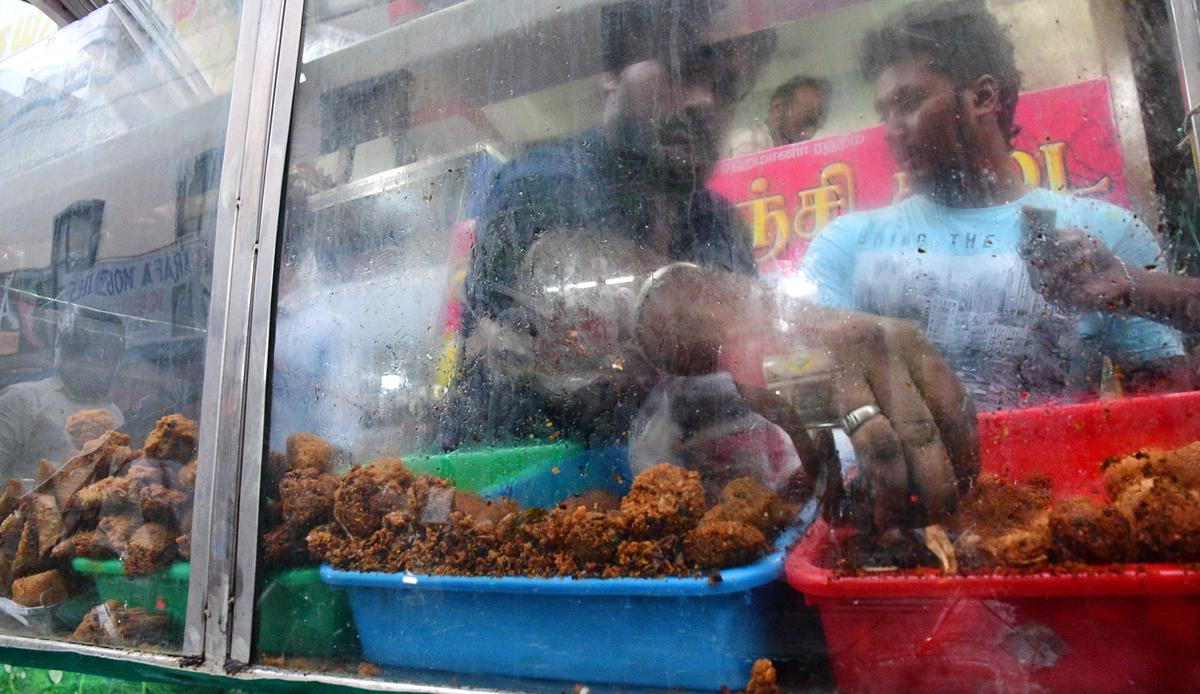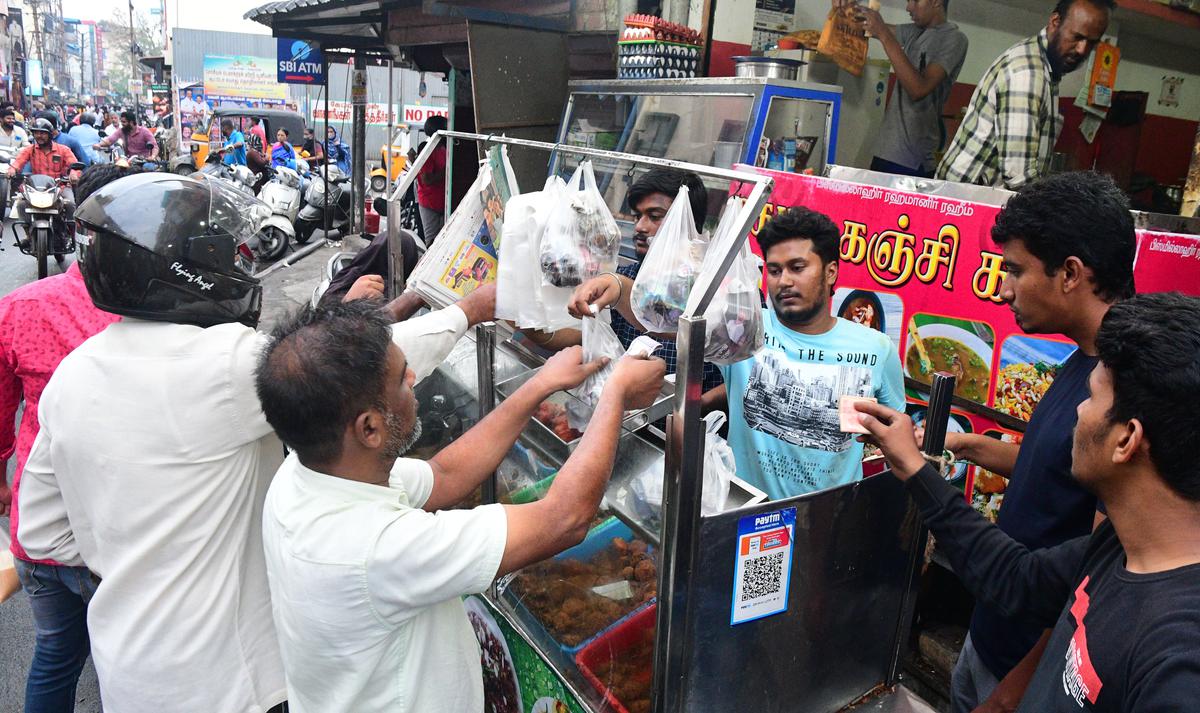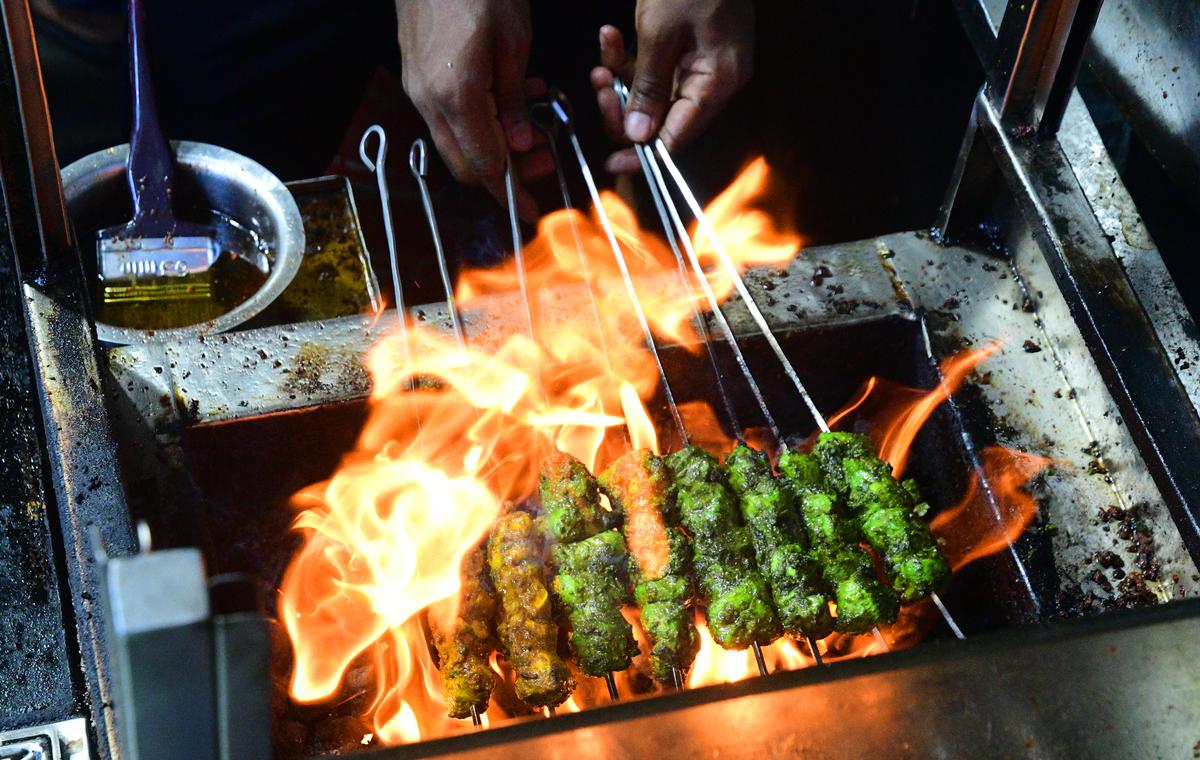The locality, that is home to one of the oldest mosques in the city, comes alive towards dusk, as hundreds walk in to buy iftar delicacies such as minced meat vadas and nungu milk
The locality, that is home to one of the oldest mosques in the city, comes alive towards dusk, as hundreds walk in to buy iftar delicacies such as minced meat vadas and nungu milk
It is almost 6pm and there is 40 minutes to go for iftar, the evening meal to break the fast during Ramzan. Ramees Raja is frying kaima (minced meat) vadas over a gigantic iron wok at a fervent pace. He works at Kaima Kanji Shop on Eswaran Koil Street, Kottaimedu, and now is his busiest hour. Outside, a glass counter has been set up for iftar snacks such as masala vadas, onion samosas, egg bondas, and minced meat cutlets. A huge crowd has formed at the shop.
This road leading to the mosque hosts over 50 outlets and cold drink shops and comes alive towards dusk. Many of them have set up counters outside for easy access, and have cut prices for the festive season. Varna Café, for instance, sells burgers stuffed with masala-infused boiled eggs for ₹10. “This is a hit with children,” says 24-year-old Salman Tariq who owns the place.
Rose, pista, and badam milk, nannari sherbet, and the season’s specialty, nungu milk
| Photo Credit: PERIASAMY M
A few blocks away, K Ramila is frying chilli soya chunks in hot oil in her pushcart shop. She has introduced the dish this season and is a little nervous about the response. “I sell onion bondas, ulundhu and chicken vadas through the year, but now is when business peaks,” she says, ladling out golden-brown chilli soya into a waiting steel colander.
As dusk nears, there is hardly space to walk along the narrow lane. Drawn by the sweet smell of rose milk, we halt at the crowded NS Cooldrinks. After almost 10 minutes of waiting, we walk away to no success at securing a drink: the shop is popular for rose, pista, and badam milk, nannari sherbet, and the season’s specialty, nungu milk. Sultaan Kebabs Corner, that stands a few metres away, is relatively less crowded, and we get to try this creamy drink that is punctuated by tiny pieces of palm fruit.
Thoufeek Raja, who is handing out orders to customers outside Kaima Kanji Shop, has no time to spare for conversation. “People come from across the city to buy snacks from us for iftar,” he says. The shop sells three pieces for ₹10, which is a steal, considering how fresh and crisp they are. Mohammed Gani lives near the railway station and is here to buy kaima vadas for his family of four. “For ₹200,” he tells Thoufeek. “These vadas are excellent,” he explains. “One can keep munching on them.”
Last year, though, the mood was different owing to the pandemic lockdowns. “We made everything at home for iftar,” says Habib Rahman, a customer. “But there is something about coming here to buy snacks. It feels nice to walk with the festive crowd, stop by for conversation with familiar faces,” he smiles.

Kaima vadas, masala vadas, egg bondas and more sell like hot cakes in the evening
| Photo Credit: PERIASAMY M
It is almost 6.30pm and we follow our noses to a wedding hall behind the Kottai Hidayathul Islam Safia Jamath Mosque. PA Badarudeen, the vice-president of the mosque’s jamath, is waiting by the entrance, inviting people inside for iftar, that the mosque offers for free. “Today, there is uthappam, sambar, green chutney, and mango juice, apart from the nombu kanji,” he says.
We try the kanji: it is mild and creamy, the rice and moong dal are cooked until one cannot tell them apart; the spices are not overwhelming and the dish warms our insides.
“It is loaded with spices that are good for the fasting tummy. This includes jeera, cloves, cinnamon, ginger, and garlic,” explains Badarudeen, adding that they make up to 700 litres of the kanji every day for 36 days during Ramzan. “People of all faiths are welcome to walk in for the nombu kanji,” he adds.

Customers throng the Kaima Kanji Shop
| Photo Credit: PERIASAMY M
The mosque’s iftar meals are prepared by M Fathima and team, who have been doing so for 20 years. “We start the prep work at 7am,” says 51-year-old Fathima. To cook the kanji, the team uses mammoth copper cauldrons. “Each of these can hold 150 litres,” she explains.
Kottaimedu is a completely different being after 6.40pm when the fast is broken. Eswaran Koil Street is almost empty. There is silence: it is time for prayer.

























